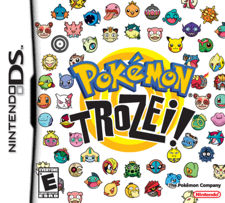Pokémon Trozei!

| |
| Pokémon Trozei! | |
| Developer | Genius Sonority |
| Publisher | Nintendo |
| System | Nintendo DS |
| Release Date | JP October 20, 2005 US March 6, 2006 EU May 5, 2006 AU June 3, 2006 KO May 17, 2007 |
| Rating | ESRB: E |
Pokémon Trozei! (known as Pokémon Link! in Europe) is a puzzle game for the Nintendo DS featuring the creatures from the Pokémon series..
Story[edit]
The game features Lucy Fleetfoot, who works for Professor P, an agent of the SOL corporation. She is sent to rescue Pokémon that have been taken by the evil organization known as the Phobos Battalion and uses a special item known as the Trozei Beamer to do so.
Gameplay[edit]
The puzzle gameplay follows the tradition of Yoshi's Cookie, and the player must use the DS stylus to shift waves of Pokémon (which act as blocks) around on a grid. Rows of four or more like Pokémon must be lined up to make them vanish. This is known as a Trozei, and following a Trozei there is a brief Chance moment in which the player can match just three Pokémon and then two to clear them as well. Ditto acts as a wild card which can match with any other type of Pokémon.
The game's main mode is the Adventure Mode which follows the adventures of Lucy Fleetfoot. The standard stages in this mode are the Secret and Huge Storages, and there is a series of Phobos Mobiles which as the bosses for the game as well as a bonus area known as Mr. Who's Den were rare Pokémon could be unlocked. Beating this mode unlocks a harder version as well as Forever Mode, which has a larger grid, less time for a Chance Trozei and requires five Pokémon for a Trozei. Endless Mode is an endless game where the level increases as time goes by, and more Pokémon could appear. Two players can also link up to cooperate in Pair Mode or competed in Battle Mode.
All of the 386 Pokémon from the first three generations are present within Pokémon Trozei!. One side goal is collecting all of the Pokémon's information in a Pokédex (matching the National Pokédex), which is done by Trozeing each individual series.